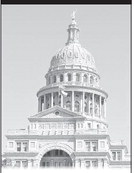TEXAS PRESS ASSOCIATION
$1 billion for vouchers, $5 billion for teachers?
Legislative budget writers are proposing nearly $5 billion to increase teacher pay and $1 billion to implement a school voucher program in the next biennium, the Austin American-Statesman reported.
The voucher program, also referred to as school choice, would provide public money for private schooling, a key priority for Gov. Greg Abbott that bitterly divided Republican lawmakers two years ago and failed to pass.
In addition, the funding would increase teachers’ pay by $4,000 and give teachers in rural school districts an additional $6,000, according to a statement by Lt. Gov. Dan Patrick. The early release of budget drafts is a signal that both chambers are getting off to a fast start in laying out their spending priorities.
Both the Senate and House are proposing an additional $400 million for school safety.
The Senate budget measure also contains $402 million to hire 567 new Department of Public Safety troopers and 159 related law-enforcement personnel.
Sharing chairmanships with minority party to end A decades-long tradition of giving at least some committee chairmanships to members of the minority party is about to end under proposed rules for the current legislative session, according to the Statesman. That means this session that Democrats, who hold 62 of the 150 seats, would be left out of those positions, though committee vice chairmanships would be given to them.
“The rule is amended to restrict the appointment of chairs of a standing committee to those members of the political party that constitutes a majority of the House membership and to provide that a majority party member may not be appointed as a vice chair of a standing committee,” the synopsis of the proposed rules says.
The change comes after then-Speaker Dade Phelan continued the bipartisan tradition in the 2023 session and drew criticism from GOP leaders such as Patrick and Texas Attorney General Ken Paxton.
TRRC seeks $100 million to fix leaky oil and gas wells The cost and frequency of plugging leaking oil and gas wells has prompted the Texas Railroad Commission to request an additional $100 million in funding to address the issue, according to the Houston Chronicle. If granted, that would increase the RRC’s statefunded budget by about 75% for the current fiscal year.
The cost to plug wells gushing with contaminated water has risen dramatically. The commission spent about $13 million on two plugging projects last September, according to the Chronicle. Fees and fines paid by the oil and gas industry have in the past covered the costs of plugging wells, but the increased costs and complexity of plugging wells has largely outgrown the revenue being received.
“The 89th Legislature will thoroughly evaluate the commission’s funding request and work with industry experts to better understand this compounding problem,” Sen. Joan Huffman, R-Houston and chairwoman of the Senate Committee on Finance, said in a statement.
The RRC should do more to hold operators accountable for plugging their own wells, according to the director of one watchdog organization.
“We have a robust oil and gas industry, the biggest in the country,” said Virginia Palacios, executive director of Commission Shift. “There’s no reason why such a profitable industry shouldn’t be able to pay for its own cleanup.”
Texans urged to report winter weather damages
Abbott is urging Texans affected by recent winter weather to report any property and agricultural damage to the Texas Division of Emergency Management’s portal: damage.tdem.texas.gov.
“As communities begin the recovery process, I urge Texans to report damages to their homes or businesses or any agricultural losses through the iSTAT (Individual State of Texas Assessment Tool) damage survey,” Abbott said. “This will help the state determine if we qualify for federal assistance.”
Winter storms brought considerable snowfall recently to areas of South Texas and the Gulf Coast that rarely see the white stuff. Several storm-related deaths were reported in Austin and Houston.
2024 was hottest on record, but rainfall totals varied
It’s hardly news to Texans who lived through it, but last year was the hottest on record, according to Dr. Mark Wentzel, hydrologist with the Texas Water Development Board. The previous record was set in 2023.
Precipitation proved to be a mixed bag, depending on the region, though October and August were extremely dry pretty much across the state. Twelve counties in East Texas had their wettest year in the past 130 years, while Jeff Davis and Presidio counties in West Texas and Uvalde County recorded their driest year since 2011.
“Drought began the year covering 39 percent of the state and expanded to cover 44 percent by the end of the year. Statewide, storage in our water-supply reservoirs saw an annual increase for the first time since 2018, up 5 percentage points during 2024,” Wentzel wrote.
State records most tornadoes in 2024 Preliminary data from the National Weather Service’s Storm Prediction Center indicates the United States experienced a record 1,855 tornadoes in 2024, breaking a 20-year-old record. Texas led the nation with 169 tornadoes last year, more than doubling the 2023 total of 78.
Dozens of tornadoes were spawned by several tropical storms and hurricanes. For example, Hurricane Beryl, which landed at Matagorda in early July, spawned at least 65 confirmed tornadoes.
A total of 53 fatalities were caused by tornadoes across the U.S., including nine in Texas from three twisters.
Borders is a veteran awardwinning Texas journalist. He published a number of community
newspapers in Texas during a 30- year span, including in Longview, Fort Stockton, Nacogdoches, Lufkin and Cedar Park. Email: gborders@ texaspress. com.

.jpg)
